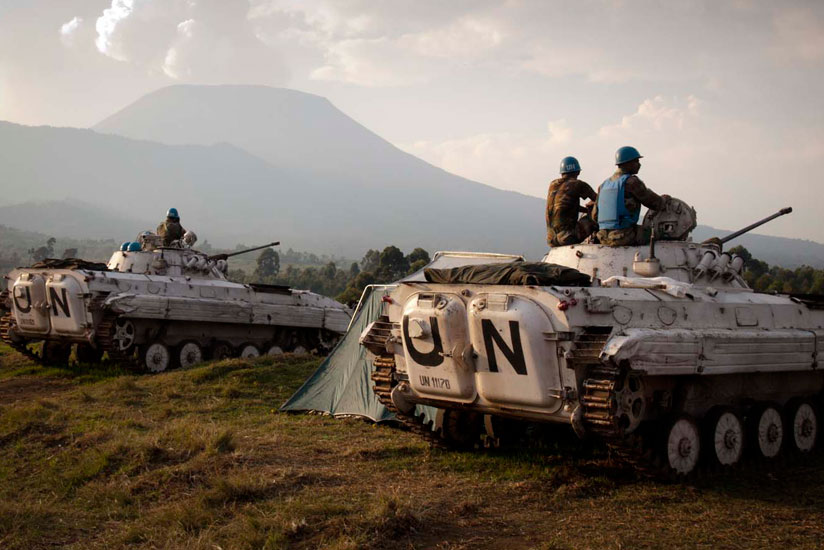Pressure continued to pile on the UN mission in Congo (Monusco) and the Congolese government over the weekend to launch military action against the FDLR militia, following expiry of the six-month deadline for voluntary disarmament on January 2.


Pressure continued to pile on the UN mission in Congo (Monusco) and the Congolese government over the weekend to launch military action against the FDLR militia, following expiry of the six-month deadline for voluntary disarmament on January 2.
In a statement, the Government of Rwanda reiterated its call to the DR Congo and the Monusco to honor their international obligations, notably the UN Security Council Resolutions 2147 (2014) and 2098 (2013) that authorise military offensive against the militia that is largely to blame for the 1994 Genocide against the Tutsi.
As predicted, the FDLR has taken full advantage of this period to expand and consolidate its military and political organisation with the aim to further destabilise Rwanda and the region. Regional and international stakeholders are presented, once again, with a critical opportunity to demonstrate their genuine commitment to neutralising negative forces and ensure lasting peace in the Great Lakes Region,” the government said in a statement.
Kigali urged the international community "to ensure that hidden agendas are not allowed to stand, any longer, in the way of sustainable peace, progress and security for the citizens of this region.”
The delaying tactics and excuses that have allowed the FDLR to perpetuate their crimes and genocidal ideology should no longer be tolerated, the statement added. Envoys call for action
International envoys, including UN Special Envoy for the Great Lakes, Said Djinnit; AU Special Representative for the Great Lakes, Boubacar Diarra and US Special Envoy for the Great Lakes and the DR Congo, Russell D. Feingold, noted "with concern” that the FDLR had not met this deadline.
The envoys added that the militia had instead used the six months to commit more human rights abuses against civilians in eastern DR Congo, recruit combatants, and champion its illegitimate political agenda.
The envoys called upon Kinshasa and Monusco, including its Force Intervention Brigade (FIB), to take all necessary measures to disarm the FDLR, in line with UN Security Council resolutions.
But Monusco said in a statement that by failing to comply, the FDLR has left the international community with no other option than military action.
"Monusco is fully ready to support a complete demobilization, disarmament, repatriation of reintegration of all FDLR,” Kobler tweeted. Questionable numbers
Meanwhile, DR Congo justice minister, Alexis Thambwe Mwamba, on Friday read a statement on national TV saying that 337 (26%) FDLR fighters had so far surrendered – out of the total 1,300 as per an October 2012 evaluation. He said that "military option had become inevitable” to disarm the militia.
But Olivier Nduhungirehe, Rwanda’s deputy Permanent Representative to the UN, told Sunday Times yesterday that "those numbers are highly questionable.” He said in that in the past six months, the FDLR had done more recruitment than demobilization.
Last year, Eugène-Richard Gasana, Rwanda’s Permanent Representative to the UN, told the Security Council that the militia’s strength was estimated at 3,640. The militia, the Security Council heard, is engaged in the various activities including beefing up collaboration with the Congolese army, especially at operation level. Uncertainty
Meanwhile, uncertainty looms about what is likely to happen especially as there has been no activity at the UN since December 31 due to New Year holidays.
Rwandan officials, including Nduhungirehe, on Friday doubted FIB would actually act as, he noted, ‘some FIB contingents do not have the will to neutralize the FDLR.’
FIB is a military formation forming part of Monusco. It is the first ever UN peacekeeping formation specifically tasked to carry out targeted offensive operations to neutralize armed groups with or without the Congolese Army.
Made up of 3,069 peacekeepers, the brigade consists of South African, Tanzanian and Malawian troops - crack infantry battalions, artillery, and Special Forces.
Last year, the militia offered to disarm, but behind the scenes, according to Enough Project, a human rights organization, it was doing the opposite - regrouping, trading gold and charcoal for weapons, and mobilising political support.
Among others, Enough Project report indicated that the militia continues to generate revenue mainly by trading gold through North Kivu and Uganda and by illegally producing and trading charcoal from Virunga National Park, a trade worth an estimated $32 million per year.
The report emphasized that FDLR’s current strategy is consistent with its longtime pattern of responding to military pressure – promising to disarm and reiterating its political aspirations for recognition as a Rwandan opposition group – while using any reprieve to regroup by building military alliances and increasing economic activity and recruitment.


